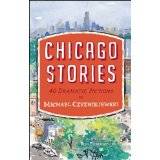Michael Czyzniejewski (chiz-nee-YEV-skee), former editor-in-chief at Mid-American Review and current editor-in-chief at Moon City Review, teaches English classes at Missouri State. His 2009 debut collection of short stories, Elephants in Our Bedroom was followed by Chicago Stories: 40 Dramatic Fictions in 2012, and this year’s I Will Love You For The Rest of My Life: Breakup Stories. While a native of the Chicago suburbs, he’s no stranger to Champaign-Urbana, having studied rhetoric here at U of I in the mid 90s. Smile Politely sat down and tried to get a tidbit about his appearance at PygLit. It went a little long, but entertained the entire time.
Smile Politely: You’ve been a vendor at Wrigley Field for the past twenty-seven years. Have you ever sold hot dogs or beer to someone who’s read your work?
Michael Czyzniejewski: I think there’s only a couple of people, actually. One is Joe Scapellato, a writer whom I didn’t know when he approached me, but we know each other now, see each other at AWP every year. That’s the only time anyone’s ever come up to me and introduced themselves and said, “Hey, I like your writing.” Or maybe he just said, “Hey, I know you’re a writer,” which is close enough. I also ran into the poet Tony Trigilio a couple of years ago and he didn’t know I worked there, but we’d recently taken some poems of his when I was at Mid-American Review. I was pouring him a beer and he saw my name tag and said, “Hey, don’t you edit a literary magazine?” It doesn’t happen as much as I’ve daydreamed it, though. I fantasize about Joe Maddon looking up from the dugout, holding up a pen and a copy of my book and waiving me over. It’s early. Do simple better.
I sadly (or not sadly at all) get recognized more often for being a beer vendor than I do a writer, people around the city saying, “Hey, don’t you work at Wrigley?” I guess that makes sense, though, as 40,000 people never sit around and watch me write stories.
SP: A lot of your stories are really short. Do you assign your students minimum word counts for their projects? (If so, do they call you out?)
Czyzniejewski: I derail that sort of criticism by being self-effacing, like Eminem at the end of 8 Mile. Then I make them write 10,000-word stories that nobody will publish. It hurts at evaluation time, but it keeps submissions of short-shorts low so I can take more spots myself.
 SP: The story “Space” in your newest collection resonates with me the most. It cuts deep, yet I find the general concept to be humorous. I’ve noticed this throughout your writing. How do you break our hearts with material that seems so funny on the surface?
SP: The story “Space” in your newest collection resonates with me the most. It cuts deep, yet I find the general concept to be humorous. I’ve noticed this throughout your writing. How do you break our hearts with material that seems so funny on the surface?
Czyzniejewski: Long answer: What makes my book consumable (or to me, writable) is that the protagonists are flawed, but not down-and-out evil. The mistakes they make, the ones that lead to the breakups, are more or less of the bumbling variety, like in “Space.” The main character makes a big mistake and pays for it, but he’s out of his element the whole time, clearly regretful, and filled with more guilt than a Catholic parade on St. Guilt’s Day. The people who are the real evil ones tend to be the antagonists, if they’re present at all. But now that you point that out, I wish I’d written just a bare-bones bad anti-hero, someone who hurt someone, knew they were doing it, and ordered extra butter on their waffles in the morning. I wanted to cover every angle of breaking up, but now that you mention it, I missed one, made too many lovable goofs and sorry sacks.
Short answer: Too many of these guys are based on me, a man who is laughable in his many foibles.
 SP: Chicago Stories is told from the points of view of real people ranging from Barack Obama to Roger Ebert to Dennis Rodman, but also inanimate objects such as the Shawon-O-Meter and Soldier Field, my favorite being “The Water Tower Suffers Post-Traumatic Stress Disorder.” When during the process of writing these did you realize that some of the story would literally be told by the city?
SP: Chicago Stories is told from the points of view of real people ranging from Barack Obama to Roger Ebert to Dennis Rodman, but also inanimate objects such as the Shawon-O-Meter and Soldier Field, my favorite being “The Water Tower Suffers Post-Traumatic Stress Disorder.” When during the process of writing these did you realize that some of the story would literally be told by the city?
Czyzniejewski: Like with the breakup book — me setting out to cover every facet of breaking up — I wanted to cover as many angles of the city as I could. Part of that was finding people from different eras, part was me finding a good mix of the famous, infamous, and unknown, and part was me experimenting. Some of them were overtimely to the time I wrote the book, 2010-2011, like the Barack Obama bowling incident, which nobody remembers now, or how people said the new Soldier Field looked like the spaceship on the cover of Parliament’s Mothership Connection. The Hilary Clinton story in that book is the best/worst example, which fictionalizes her reaction the moment she realizes that bin Laden’s been shot, when she covers her mouth. Of all the Hilary stories I could have used, that’s probably not even in the top twenty, especially now.
But sometimes I just got lucky, like with the Water Tower story, that it’s more of a lasting thing and I was smart enough — that’s where the luck comes in — to include a bunch of those, less of the forgettable news tidbits. I hope they’ll help that book age better.
SP: Tell me about your experience as an undergrad at Illinois. What did you learn about writing, who were your favorite teachers, are any of your classmates from that period publishing now?
Czyzniejewski: Ah, here’s where the word count in this interview will really add up:
Picture a scruffy-faced, chunky boy, dropped off at Scott Hall by excited parents, their youngest child of seven leaving the nest, their house their own for the first time in ….
I had a rough start to things and don’t recall much from freshman year. Like many creative writing majors (officially, I was a rhetoric major), like Lorrie Moore suggested, I failed at something else first, mechanical engineering. I was probably the last student admitted to that college, slipping in when some kid got funding for MIT at the last minute. Both my roommates had had perfect SATs and got 4.0s that first year. My lava lamp had a higher GPA than I did (though even he’d admit he took pretty easy classes). Instead of changing my major, I stupidly soldiered on and was sent home to regroup (i.e., live with my parents and get my old pizza place job back). I came back for my junior year and wrote a lot of stories. None of them were good, of course, but when I wrote a bad story, nobody handed me statistics about how I was in the bottom 1 percentile of everyone who wrote stories on earth.
I fell in love. She had brown hair and green eyes and her name was ….
Oh, I’m doing it again. Five of the people still reading this interview just took up drinking. (I did pour a finger of bourbon at this point, but stopped at one when he stopped himself — ed.)
Anyway, I met a couple of people who helped me a lot, Mike Madonick, who is still there, torturing students with nickname-giving and his “hair.” And Jean Thompson, whom became a good friend and confidant, whom I still talk to. I’m in touch with one student from workshops, Laura Otto, who is a really good writer. She came to a reading once in Chicago, fifteen or twenty years later. She remembered my combat boots and Dick Justice T-shirt. Good times.
Keep the good times rolling by joining the unpronounceable but easily-listenable author at his reading, which takes place directly after Christine Sneed’s and before Ladan Osman’s at Cafeteria & Company, Thursday the 24th at 7:30 p.m., no cover.
Editor’s comments by Rebecca Knaur, unbeknownst to John Milas.








